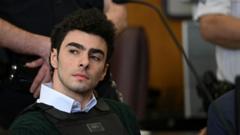Luigi Mangione has officially entered a not guilty plea to all federal charges stemming from the homicide of UnitedHealthcare CEO Brian Thompson, who was shot and killed outside a hotel in Manhattan last December. The 26-year-old Mangione, who was arrested shortly after the incident, faces significant charges, including murder and stalking. Prosecutors are not only pursuing a conviction but also aggressively seeking the death penalty, claiming that Mangione's actions were politically motivated to convey a message against the health insurance sector.
During Friday's court appearance, Mangione was dressed in prison garb and appeared in handcuffs as he addressed the court and proclaimed his innocence. Notably, the federal prosecutors have described Thompson's murder as an instance of political violence, positing that it aimed to spur resistance against systemic issues within the healthcare industry. U.S. Attorney General Pam Bondi announced earlier intentions to pursue capital punishment, emphasizing the serious nature of the offense.
The hearing included important developments regarding pre-trial procedures. Judge Margaret Garnett emphasized coordination among the parties involved, as defense attorneys expressed concerns about the volume of evidence—estimated at three terabytes—necessary for preparation. Consequently, no federal trial date is expected before 2026, with the next court session scheduled for December 5 to establish a specific trial timeline.
Mangione's defense attorney voiced apprehensions regarding the prosecution's strategies, including claims of "eavesdropping" on privileged conversations from incarceration. The legal team is also positioning for a preemptive strike against the death penalty, requesting that the government be barred from pursuing it, given the recent formal filing by prosecutors.
The arrest and subsequent trial have sparked a considerable public discourse, highlighting mounting frustrations surrounding the privatization of healthcare. While some supporters have dubbed Mangione as a folk hero, others have raised alarms regarding the broader societal implications of his actions. Indeed, oddities at the crime scene, including shell casings marked with terms like “deny,” “defend,” and “depose,” have fueled heated discussions about the ethics and operations within the healthcare industry.




















